Hey folks! Ever wondered if towing puts extra strain on your brakes? Well, in this article, we’re about to tackle that question head-on. Let’s explore whether towing has any impact on the lifespan of your trusty brakes. You might be in for a surprise!
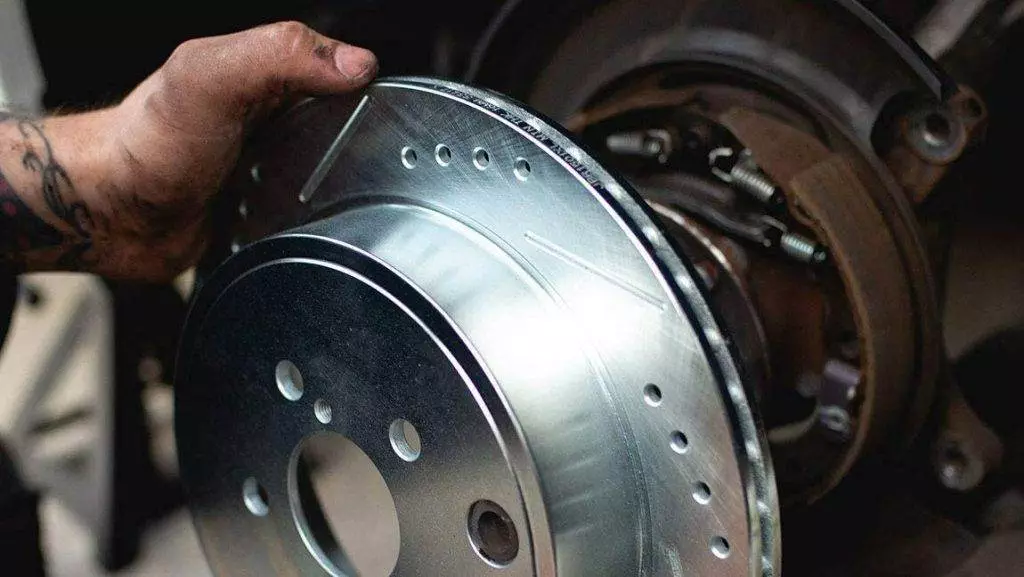
This image is property of www.thedrive.com.
What is towing?
Definition of towing
Towing refers to the act of pulling or hauling a load behind a vehicle using a hitch or other towing mechanism. This load could be a trailer, a boat, or any other object that exceeds the towing vehicle’s capacity to carry on its own. Towing is commonly used for recreational purposes such as camping, boating, or moving large items.
Types of towing
There are various types of towing methods depending on the type of load and the towing vehicle. Here are some common types:
- Conventional Towing: This is the most basic form of towing, where a vehicle tows a trailer or another vehicle using a hitch. It is commonly used for transporting small to medium-sized loads.
- Fifth-Wheel Towing: This type of towing involves a fifth-wheel hitch that is installed in the bed of a pickup truck. It is commonly used for towing larger trailers, such as RVs, horse trailers, or heavy-duty equipment.
- Flatbed Towing: Flatbed towing utilizes a flatbed truck or a trailer with a flat platform for towing. It is commonly used for towing vehicles that cannot be driven, such as those involved in accidents or breakdowns.
- Dollies: Dollies are small trailers that have two wheels and are used to tow a vehicle by either the front or rear wheels. They are commonly used for towing cars that cannot be driven.
- Tow Bars: Tow bars are devices that connect the front bumper of a towed vehicle to the rear of the towing vehicle. They are commonly used for flat towing or dinghy towing, where the towed vehicle’s wheels remain on the ground.
How do brakes work?
Braking system components
To understand how towing can affect brake wear, it is necessary to have a basic understanding of how brakes work. The braking system consists of several components, including brake pads, calipers, rotors (or drums), brake lines, and a master cylinder.
When the brake pedal is pressed, hydraulic pressure is generated in the master cylinder. This pressure is then transmitted through the brake lines to the calipers (or wheel cylinders in drum brakes), which activate the brake pads (or shoes) to create friction against the rotors (or drums). The resulting friction between the brake pads and rotors (or shoes and drums) slows down or stops the vehicle.
Braking process
When the towing vehicle is in motion, the braking process becomes crucial. As the driver applies the brakes, the hydraulic pressure is increased, causing the brake pads to press against the rotors. This friction generates heat, which helps convert kinetic energy into thermal energy, allowing the vehicle to slow down or stop.
The braking process involves a combination of factors, including the force applied to the brake pedal, the friction between the brake pads and rotors (or shoes and drums), and the mechanical components of the braking system.
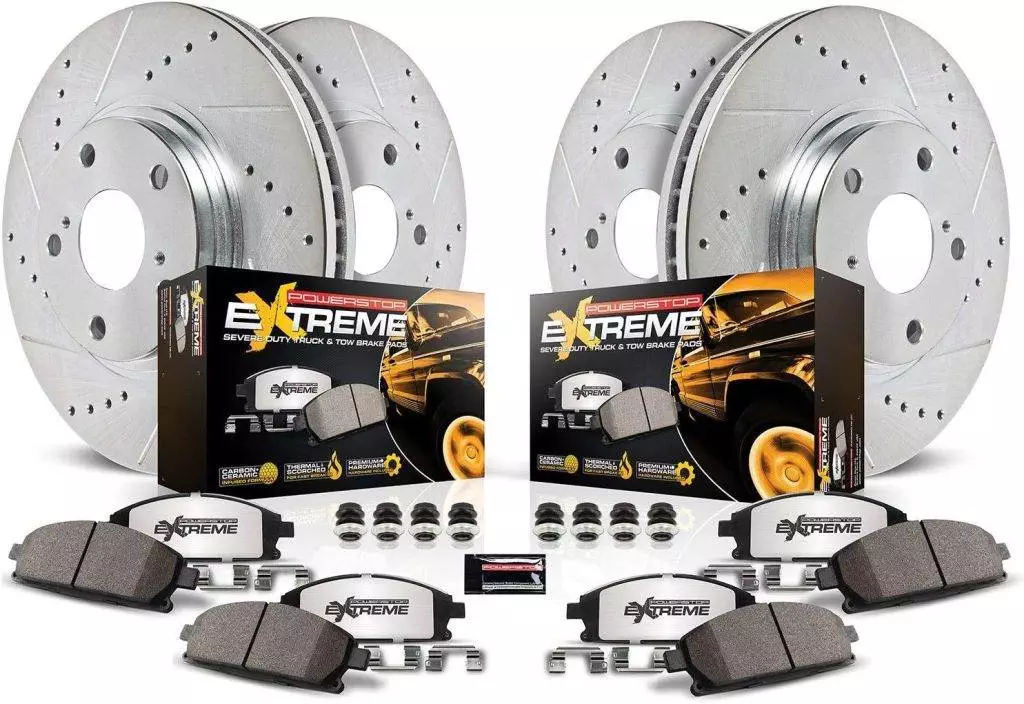
This image is property of Amazon.com.
Factors affecting brake wear
Several factors can contribute to brake wear, and they can be amplified when towing is involved. Understanding these factors is essential in comprehending the impact towing has on brake wear.
Weight of the load being towed
The weight of the load being towed plays a significant role in brake wear. The braking system has to work harder when towing a heavier load, as the increased weight requires more force to slow down or stop the vehicle. This increased workload puts additional strain on the brake components, causing them to wear out faster.
Type of brakes
The type of brakes used in the towing vehicle also affects brake wear. Two common types of brakes are disc brakes and drum brakes. Disc brakes offer better heat dissipation and are generally more efficient than drum brakes, which tend to generate more heat under heavy braking. Therefore, the type of brakes can influence the rate at which brake components wear.
Driving conditions
The driving conditions encountered while towing can have a significant impact on brake wear. Factors such as terrain, road conditions, and weather play a role in brake wear. For example, driving on steep or hilly terrain requires more frequent and intense braking, leading to increased wear on the brakes. Similarly, driving in wet or snowy conditions may also affect brake performance and wear.
Driving habits
Driving habits, such as aggressive braking and acceleration, can accelerate brake wear when towing. Frequent and sudden braking puts more stress on the braking system, causing increased wear on the brake pads and rotors. On the other hand, maintaining a smooth and consistent driving style can help reduce brake wear.
Maintenance of brakes
Proper maintenance of the braking system is crucial to ensure optimal performance and longevity. Neglected maintenance, such as failing to replace worn brake pads or ignoring signs of brake problems, can lead to accelerated brake wear. Regular brake inspections, adjustments, and lubrication are essential to keep the braking system in good working condition.
Effects of towing on brake wear
Towing places additional strain on the braking system, leading to several effects on brake wear.
Increased load on brakes
When towing, the weight of the load adds extra strain to the braking system. This increased load requires the brakes to work harder and generate more friction to slow down or stop the vehicle. As a result, the brake components experience more wear and tear.
Increased heat generation
Towing can cause the brakes to generate more heat than during normal driving. The increased weight being towed puts a higher demand on the braking system, which produces more friction and heat. Excessive heat can lead to accelerated brake wear and potential brake fade.
Brake fade
Brake fade is a phenomenon that occurs when the brakes overheat, causing a loss of braking performance. When towing, the braking system is more prone to experiencing brake fade. This can be dangerous as it reduces the vehicle’s ability to slow down or stop effectively, especially when going downhill or in emergency situations.
Increased wear on brake pads and rotors
Towing places extra stress on the brake pads and rotors, causing them to wear out faster. The increased workload on the braking system can lead to thinner brake pads and grooved or warped rotors. This accelerated wear can result in a decrease in braking efficiency and may require more frequent brake replacements.
Decreased braking performance
Towing heavy loads can negatively impact the overall braking performance. The additional strain on the braking system can diminish its ability to slow down or stop the vehicle effectively. This decreased braking performance puts both the towing vehicle and the load at risk, especially in emergency situations or when traversing challenging driving conditions.
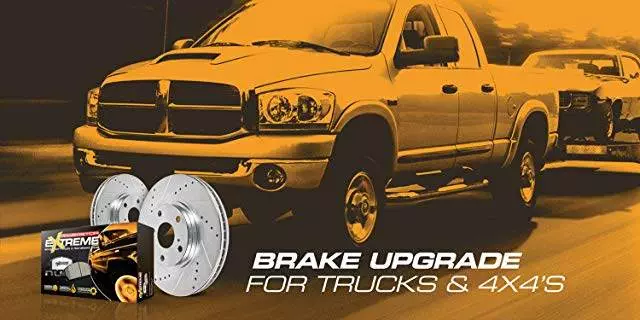
This image is property of www.powerstop.com.
Weight of the load being towed
Impact of load weight on brake wear
The weight of the load being towed directly affects the strain placed on the braking system. Heavier loads increase the demand on the brakes, requiring more force to slow down or stop the vehicle. This increased workload leads to faster wear of the brake components.
Proportional relationship between load weight and brake wear
There is a proportional relationship between the weight of the load being towed and brake wear. As the load weight increases, the brake components have to work harder to control the vehicle’s speed, resulting in accelerated wear.
Calculating load weight’s effect on brake wear
Calculating the specific effect of load weight on brake wear is challenging, as it depends on various factors such as the towing vehicle’s braking capacity, driving conditions, and the type of brakes used. However, it is safe to assume that the heavier the load being towed, the more strain it puts on the braking system, leading to faster brake wear.
Type of brakes
Disc brakes vs. drum brakes
Disc brakes and drum brakes are two common types of brakes used in vehicles. Disc brakes consist of a rotor and caliper, while drum brakes have a drum and wheel cylinder. The type of brakes used can affect brake wear during towing.
Impact of brake type on wear
Disc brakes generally offer better heat dissipation and are more efficient in stopping a vehicle. They tend to handle the increased workload of towing better than drum brakes. Drum brakes, on the other hand, are more prone to heat buildup and can wear out faster when towing heavy loads due to increased heat generation.
Comparing wear rates between disc and drum brakes
It is difficult to provide an exact comparison of wear rates between disc and drum brakes as it depends on various factors such as the specific vehicle and braking system design. However, in general, disc brakes have been found to have lower wear rates during towing compared to drum brakes. This is due to their ability to dissipate heat more effectively and withstand the increased workload associated with towing.
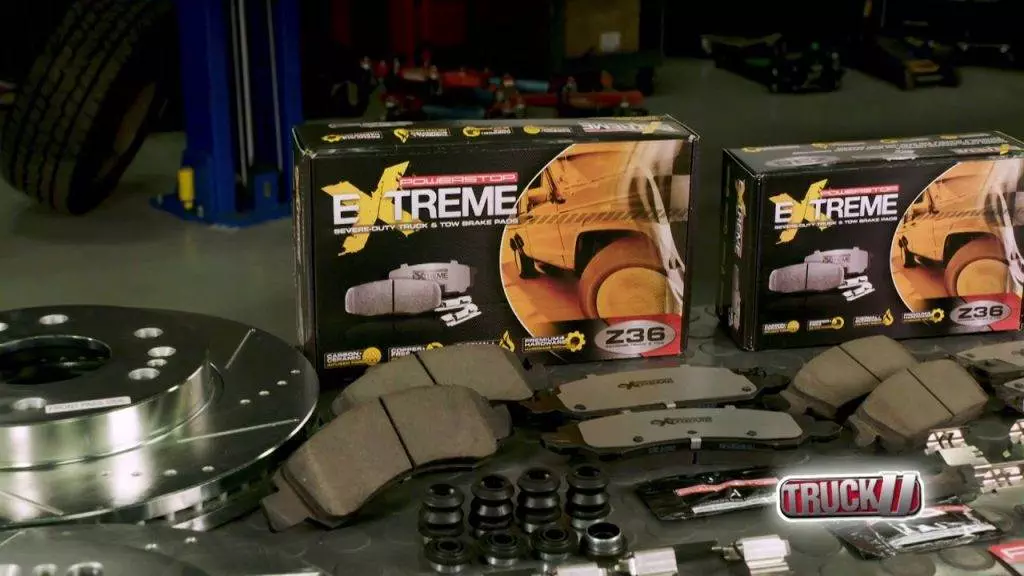
This image is property of i.ytimg.com.
Driving conditions
Effect of towing on different driving conditions
Towing can have varying effects on brake wear depending on the driving conditions encountered.
Influence of terrain and road conditions
The terrain and road conditions have a significant impact on brake wear when towing. Driving on steep or hilly terrain requires more frequent and intense braking, resulting in increased wear on the brakes. Additionally, driving on rough or uneven roads can also contribute to accelerated brake wear.
Driving in hilly or mountainous regions
When towing in hilly or mountainous regions, the increased load and the need for more frequent and intense braking can significantly impact brake wear. Uphill driving requires more force to overcome gravity, while downhill driving increases the risk of brake fade due to increased heat generation. Towing in these areas may require more cautious driving and potential brake component upgrades.
Stop-and-go traffic and city driving
Driving in stop-and-go traffic or in congested city areas can also affect brake wear when towing. The constant acceleration and braking required in these conditions put additional stress on the braking system, leading to increased wear on the brake components. Being mindful of driving habits and allowing for proper braking distance can help minimize brake wear in these situations.
Driving habits
Impact of driving style on brake wear
Driving style plays a significant role in brake wear when towing. Certain driving habits can considerably accelerate brake wear.
Aggressive braking and acceleration
Frequent and sudden braking or rapid acceleration can put excessive strain on the braking system, leading to accelerated wear on the brake components. When towing, it is essential to maintain a smooth and consistent driving style to reduce brake wear.
Coasting and brake application
Coasting refers to driving for extended periods without any throttle or brake application. While it might seem like an efficient way to save fuel, it can actually contribute to increased brake wear. Coasting followed by heavy brake application to slow down or stop the vehicle puts extra stress on the braking system and wears out the brake components faster.
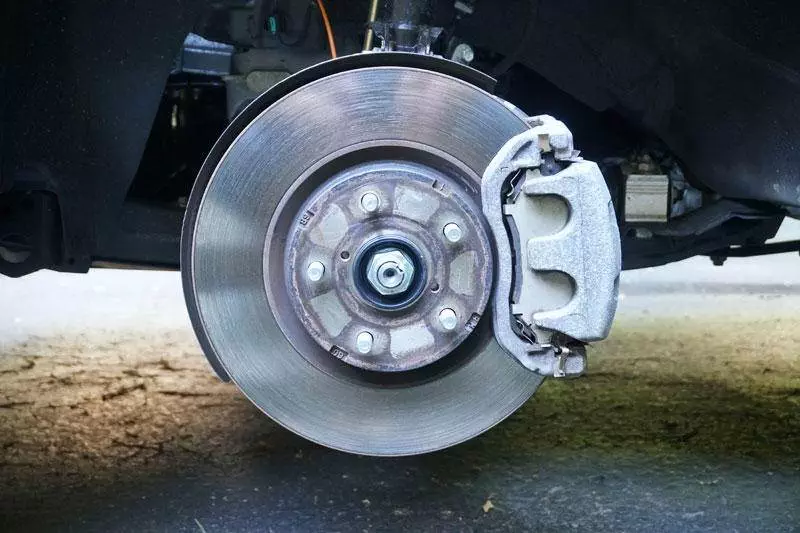
This image is property of cdn.dealerspike.com.
Maintenance of brakes
Regular brake inspections and servicing
Routine brake inspections and servicing are vital to maintain brake performance and extend their lifespan. Regular inspections can help identify and address any issues before they escalate and cause significant brake wear. Components such as brake pads, rotors, and calipers should be checked for wear and proper function periodically.
Effect of neglected maintenance on brake wear
Neglected maintenance can lead to accelerated brake wear. Failing to replace worn brake pads, ignoring signs of brake problems (such as squealing or grinding noises), or neglecting regular brake fluid changes can all contribute to decreased brake performance and premature wear of the brake components.
Importance of proper adjustments and lubrication
Proper adjustments and lubrication are essential for optimal brake performance and longevity. Brake components should be adjusted according to manufacturer specifications to ensure even wear and effective braking. Additionally, proper lubrication of caliper pins and other moving parts reduces friction and promotes smooth operation, ultimately reducing brake wear.
Tips to minimize brake wear during towing
While towing inevitably leads to some degree of brake wear, certain practices can help minimize wear and ensure the longevity of the braking system.
Use a trailer with brakes
Whenever possible, opt for a trailer equipped with its braking system. This can significantly reduce the strain on the tow vehicle’s braking system, as the trailer’s brakes share the workload. Trailer brakes are particularly useful when towing heavier loads or traveling through challenging terrains.
Distribute weight evenly
Proper weight distribution is crucial for maintaining balanced braking and reducing wear on specific brake components. When loading a trailer, distribute the weight evenly to avoid excessive strain on any particular axle or set of brakes. This ensures that each brake is working efficiently and minimizes the risk of premature wear.
Upgrade braking system if necessary
If you frequently tow heavy loads or travel in challenging conditions, consider upgrading your vehicle’s braking system. Upgraded brakes, such as larger rotors, performance brake pads, or high-capacity calipers, can provide enhanced stopping power and better heat dissipation, resulting in reduced wear and improved braking performance.
Avoid excessive speed and sudden braking
Maintaining a moderate and consistent speed while towing reduces the need for sudden or aggressive braking. Excessive speed increases the workload on the brakes and generates more heat, leading to accelerated wear. Avoiding sudden braking whenever possible helps prolong the lifespan of the brake components.
Allow brakes to cool down
After towing for extended periods or during intense braking situations, it is essential to allow the brakes to cool down. Continued braking without adequate cooling time can lead to brake fade and accelerated wear. Find a safe spot to pull over and let the brakes cool before resuming towing.
Follow manufacturer’s towing recommendations
Always refer to the manufacturer’s towing recommendations for your specific vehicle. These guidelines provide valuable information about the vehicle’s towing capacity, recommended trailer brakes, and any specific maintenance procedures. Following these recommendations ensures safe towing and helps minimize brake wear.
Maintain proper braking distance
Maintaining a proper braking distance is crucial when towing. The increased weight being towed requires a longer stopping distance, as the braking system needs more time to slow down or stop the vehicle. Allowing for adequate braking distance reduces the strain on the brakes and helps minimize wear.
In conclusion, towing can accelerate brake wear due to increased load, heat generation, and other factors. Understanding the impact of towing on brake wear, as well as implementing proper maintenance practices and driving techniques, can help minimize wear and ensure the longevity of the braking system. By following these recommendations and staying mindful of the factors that affect brake wear while towing, you can enjoy a safe and efficient towing experience.